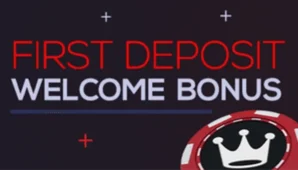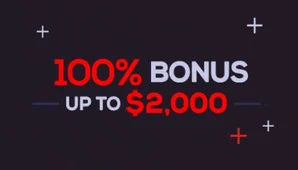The Winamax channel's Inside the Mind of a Pro series, in which Winamax Team World Series of Poker participants discuss their play hand after hand, is celebrating its 10th anniversary. In honor of this event, an unusual episode was released, whose hero was not the most professional poker player, but certainly one of the most charismatic: the legendary Gus Hansen.
Hansen's WPT victories in the early 2000s ushered in the era of televised poker and did little less to fuel the rise of poker than Moneymaker's success. And his book, Every Hand Revealed, in which Gus described his 2007 Aussie Millions victory, is still fondly remembered by many pros. Hansen's approach was inspiring and thought-provoking. 17 years later, in a completely different poker galaxy, Gus is back in the hunt.
Has his game changed over the years? Let's take a look.

The full video from Winamax is available on YouTube, mostly in French (except for Gus Hansen's dialogue).
Gus Hansen: Breakfast with the Winamax team, my new great team. Great guys and girls, I'm looking forward to this. Haven't played a lot of tournaments lately, and this is a big one. The World Series of Poker Main Event always gets the emotions high. Everybody wants to win this one. I love my new teammate, I've had a lot of talk with Joao Vieira. Incredible player. If I have a question, he's the guy to go to. Always nice to have a chat with your teammates before a big tournament.
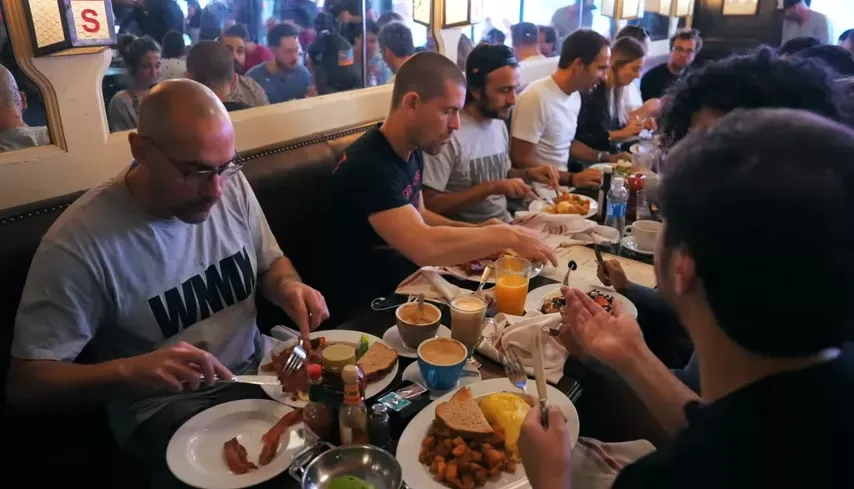
I haven't played much lately, but the WSOP Main Event is a special tournament. Everyone wants to win, and emotions are running high.
— Joao, let's say you're in an environment, and the button goes 2x (first in). He does that with a 40% range. How often do you defend in the small blind?
— 75-80%.
—How wide should we defend from the small blind?
— Around 30%.
— 30%? You actually go lower than his %, even though you already put money in the pot? Okay, fine.
— 40% from the button is tight. It should be 52-55%. I would go somewhat tight.
Nice send-off from the teammates.
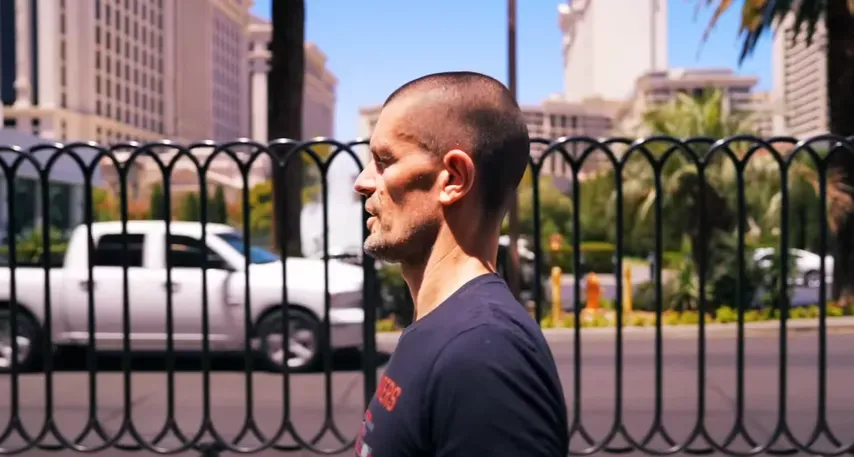
A little walk in the sun before sitting down at the table. I feel well prepared. Got my last question in with Joao, so it's time to focus, get a good read on the players at the table, and don't let them get a good read on me. There's a chance they might know my face beforehand, but I think in general, they have the wrong impression that I'm the craziest guy in the world. Meanwhile, I think that generally, in these Hold'em tournaments, I play pretty tight, fairly strong starting hands, so... I hope I can surprise them and get off to a good start.
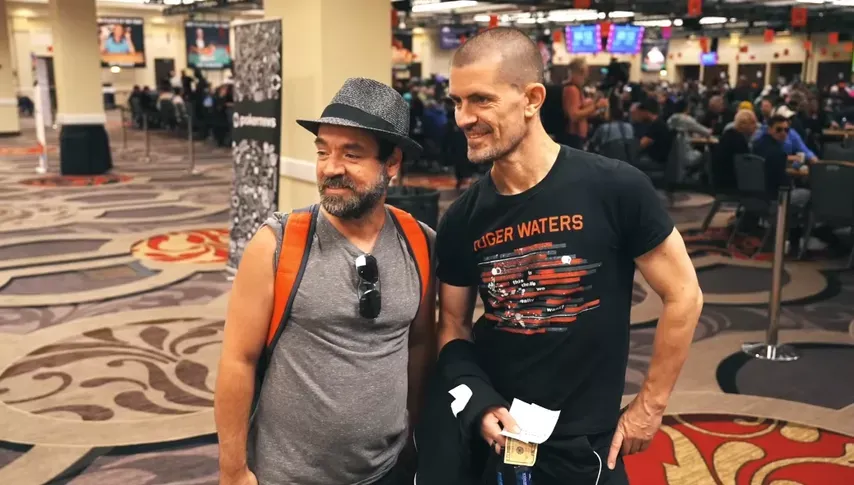
Well... I didn't make it in time. I might have missed a hand or two, but this is better than usual and I still have a big stack. Deep stack poker.
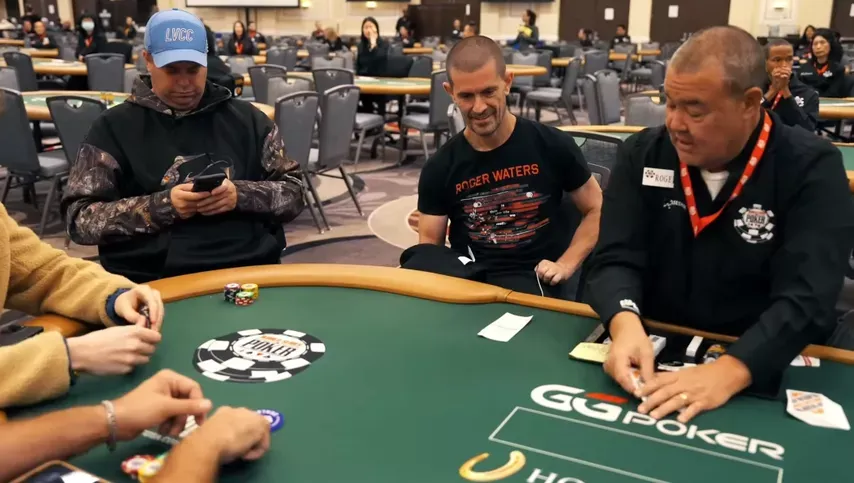
It's time to look around. I don't know the first or second player. Then an older guy... a younger guy... and a very young one, probably very aggressive. It looks like a pretty average table. However, I quickly convince myself that all my neighbors are very decent players. I'll have to work hard to get a stack.
Everyone folds to my small blind. I have a hand that looks like it deserves a min-raise.
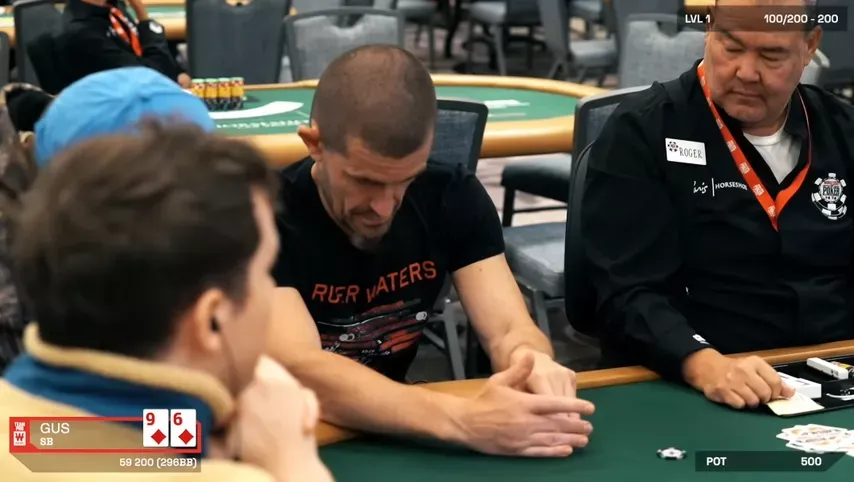
The big blind calls and I see my first flop.
Flop (1,000):
Well, not bad! Flush draw and, overall, a good board to continue with a small bet to see what the opponent has in mind. I bet 300 chips. The position of his hand makes it look like he's about to fold. And he folds. Getting the first pot never hurts.
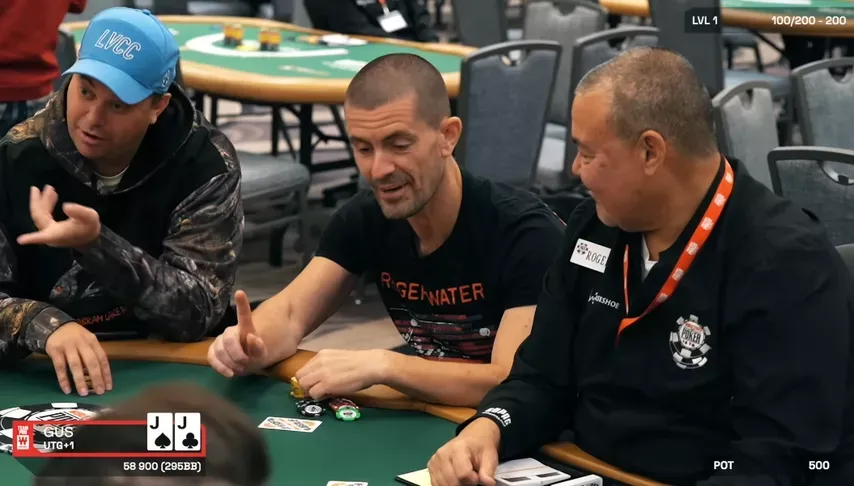
A normal hand in early position. I raise to 500. The hijacked player calls, followed by the cutoff and the big blind.
Flop (2,300):
A very decent flop for jacks, especially with four. I bet 600. The continuation bet eliminates two people; only the hijack calls.
Turn (3,500):
It's not the card I wanted to see. I check. I'm beaten by so many hands that it might be time to surrender. But the opponent bets 1,200, a very small amount, and I'm incredibly curious. I call.
River (5,900):
A card that doesn't change anything. Either I got beaten on the turn or I'm still winning. I check again, waiting... I don't even know what to expect! Do I want to catch a bluff? The opponent bets 1,600. What am I winning at? , , etc. Again, a very small bet. I think my weakness is that when my opponents make small bets in No-Limit Hold'em, curiosity always gets the better of me. The chances of him bluffing are very small, but I call the bet. He shows a set of sevens: bad news, as expected. I don't think I can fold the turn, but on the river, I think it's possible. But the bet was very small...
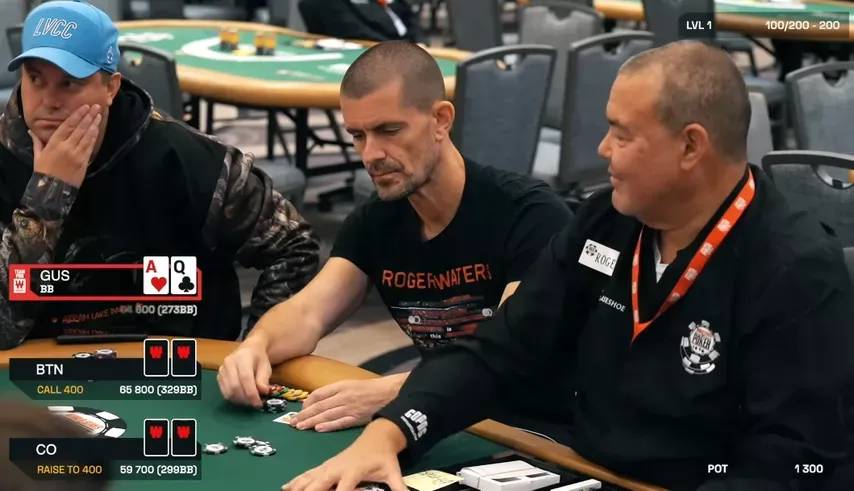
The cutoff raises, the button calls, I have AQo in the BB, generally a good squeeze situation, but I only make one call: I decide I'll play this tournament as calmly as possible. I want to see flops and play like Daniel Negreanu: small ball.
Flop (1,500):
It's not a dream flop, but if I had the best hand preflop (and that will happen very often), then not much would have changed. The cutoff bets 600 chips, and the button folds. I'm beaten by a jack, and there aren't many jacks in the deck. I make a small raise: 1,300. And the opponent folds. So I was actually ahead. I could have decided the hand preflop, or I could have called now and given him a chance to continue his bluff; that's also a very reasonable approach.
I won two small pots and lost the medium one. I'm still trying to understand my opponents.
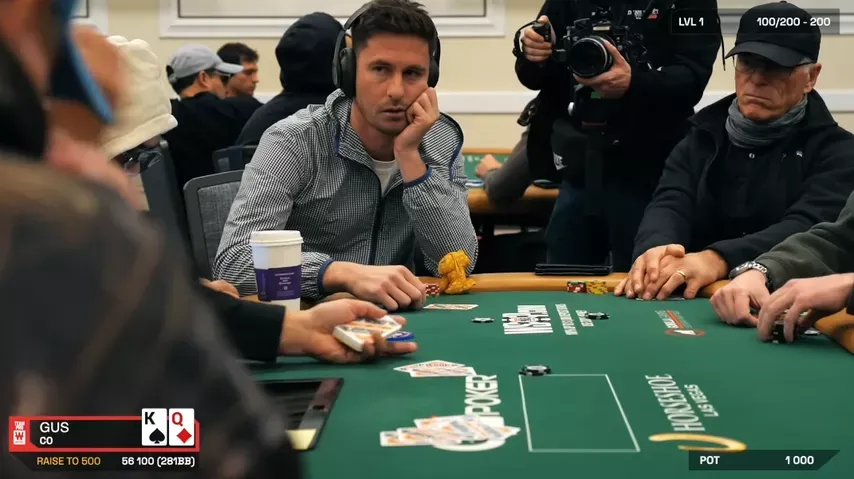
I raise with KQo and get called by the BB, who seems conservative and doesn't bluff.
Flop (1,300):
I catch the highest pair and pass behind.
Turn (1.300):
I didn't want to see this card at all! The BB checks again. I bet 300 chips and take the pot. I could have checked, but why let him catch his outs with Although if I'm winning there won't be many outs out there.
I'm starting to get a better feel for the table. I seem to have a great position. The players in first, second, and third position are very selective and rarely enter pots. Perhaps I can attack their blinds with impunity.
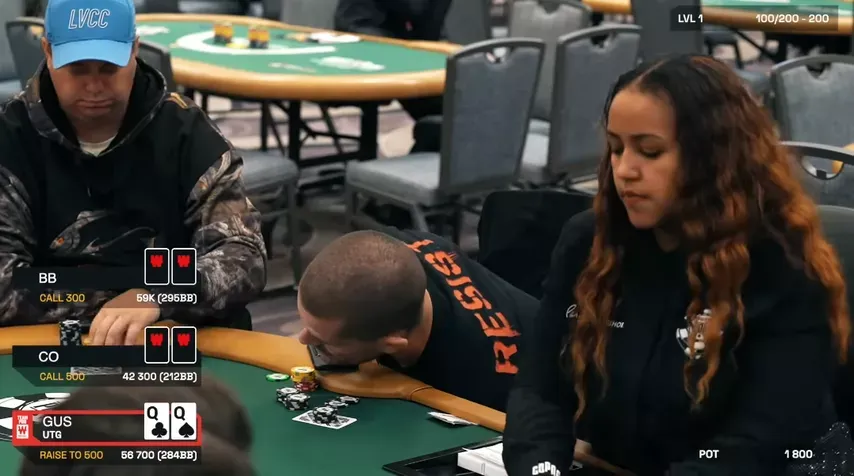
Wow, ladies! Where do so many good hands come from? I raise and get action from two players.
Flop (1,800):
I'm not very happy with this flop, so I'm going to check. The player in fourth position seems aggressive, and even though he bets 1,000, I'm not willing to fold my queens immediately. Call.
Turn (3.800):
A card that doesn't change anything: I'm either ahead or way behind. I wait to hear a check, and then I'll value bet on the river. However, he bets 2,500. An unpleasant situation. Perhaps in this tournament, the World Series Main, a fold is possible. But I stubbornly keep calling.
River (8,800):
I'm getting beaten by connections with the king and ten. I'm beating him with random straight draws, but he bet the flop and continued on the turn... It doesn't look good. I should have folded the turn!
The opponent bets 4,000. The odds are 3 to 1, but I don't think he'll win the pot very often. And even then, the size... I would have thrown them away a long time ago against a bigger bet, but against a player I've already marked as aggressive, I might not be able to resist.
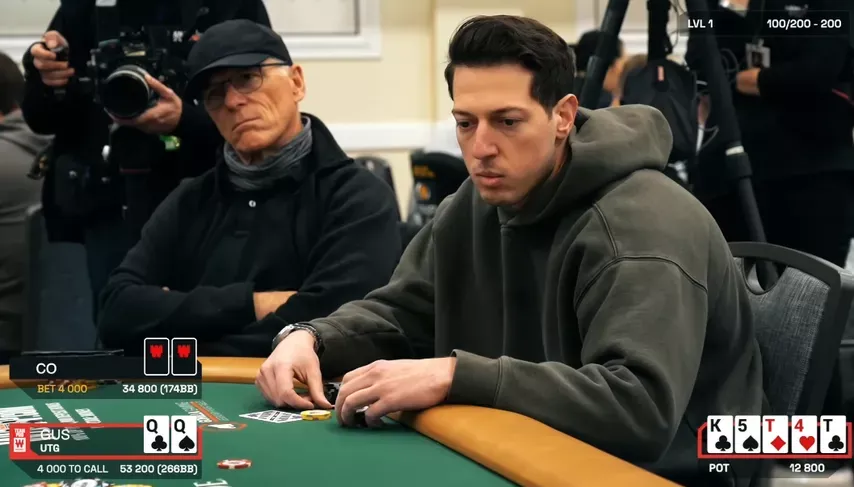
And yet I fold. The most likely hand he can bluff with this way is And I have two queens. So I fold. We're slowly losing, but this is the Main, we have a lot of chips, we're in no hurry, and we're not worried.
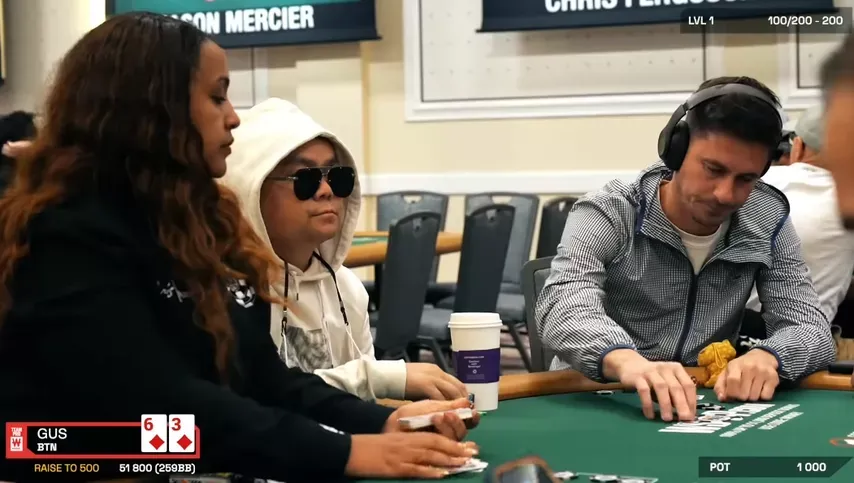
I open with 63s, and with very tight players in the blinds, I'll often raise from the button. The big blind calls.
Flop (1,300):
What a good flop! Check from the BB. I check back, that's fine too.
Turn (1,300):
Now with a full house, even better. Check from the BB. It's a shame I didn't bet. So I bet 400 chips. I just want to steal the pot; it's a standard bet... He seems interested. Will there really be a check-raise? I could only be grateful. But no, he calls.
River (2,100):
Nothing changes, but suddenly the BB leads for 1,700. I'm not bothered at all! The only question is how much I expect to win and how much he might call me for. Of course, this could also be a complete bluff with random T5s to get me out of a pot where I wasn't showing much strength. I decided to raise to a decent amount: 7,000. Bluffs will fold to any size, and if he played a four or nine oddly, it's unlikely he'd care about my size.
I feel like he thinks I have nothing. Unfortunately, it seems he doesn't have anything either. Foldea. I haven't recovered my initial stack yet, but the day is just beginning.
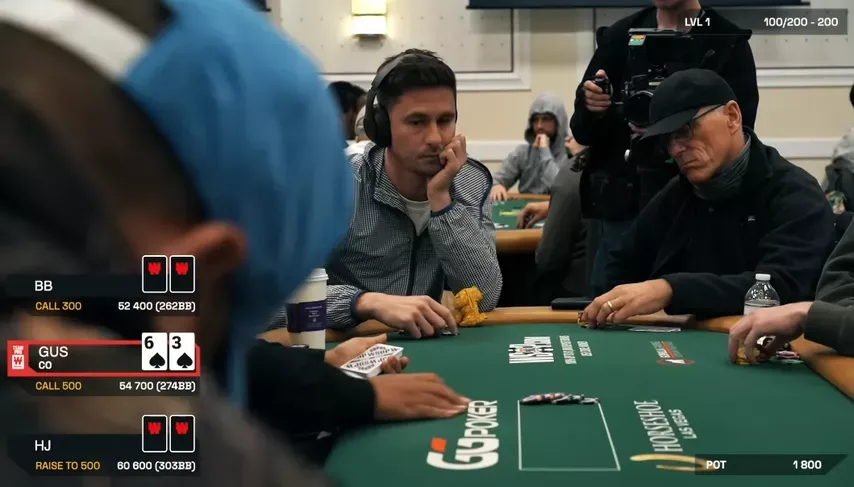
The player in position #8 seems to be quite active, calling his raise with 63s. The BB also calls.
Flop (1,800):
I get a great draw! Position #8 bets 800. Two options: call or raise! I choose to call. The tight player in the big box folds, leaving us heads-up.
Turn (3,400):
It's not a good turn, but... it shouldn't connect with this board very often. And when it does, I decide to take the initiative. Still, I call his standard continuation bet, having another player behind me: I often have something decent. I bet 1,600, and he immediately folds.
I still don't know any of my opponents at the table by name, except, in part, the player in position #7, with whom I played online cash games.
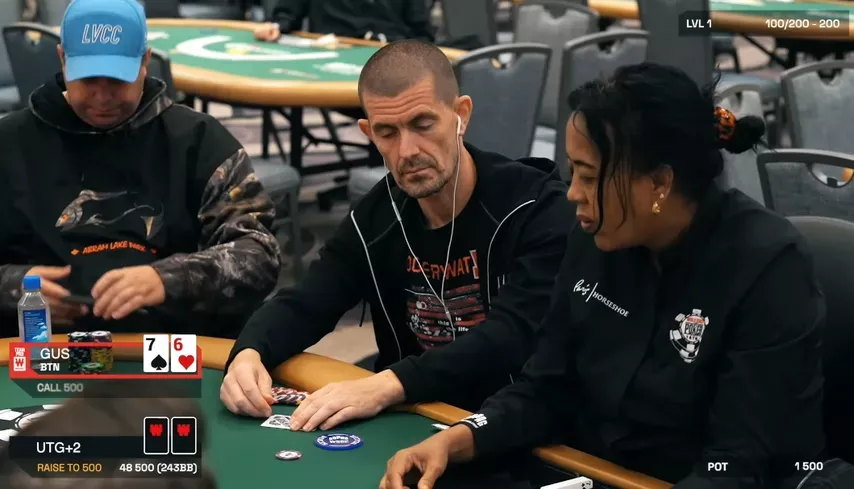
The player in position #6 raises. It's definitely not worth playing my hand against a player in early position. But I still call. The big top also calls.
Flop (1,800):
I get two checks. I have a third pair. I'll try to take the pot with a small bet. I bet 400 chips. The BB calls, and the raiser folds.
Turn (2,600):
I'm not very happy with my hand, but the three of diamonds gives me the opportunity to try to knock him out of the pot if he has a nine in his hand... However, I also check.
River (2,600):
The big-time hand checks quickly. I have the nuts unless I get a big surprise. The same player: how much could he call? I bet 1,700, but he quickly folds. Perhaps it would have been better not to let him realize his equity with a small bet on the turn. I make another mental note.
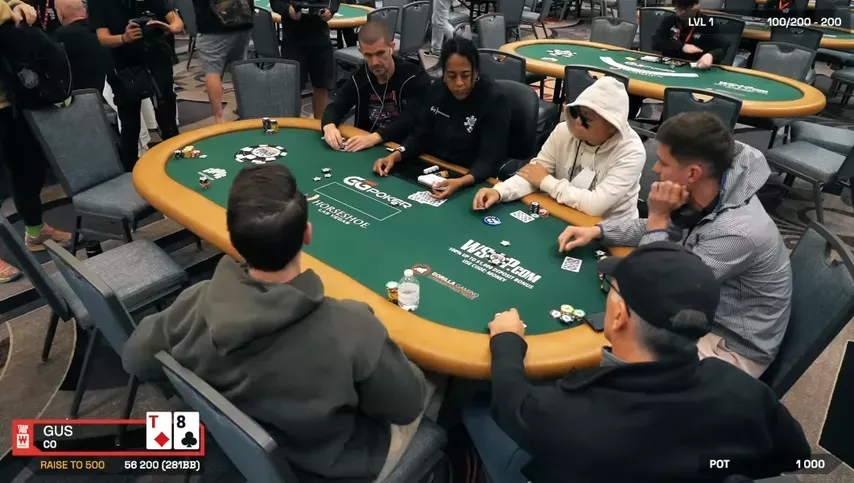
The last hand of the level has already been announced as a break. When my turn comes, I raise with T8o from the cutoff. Perhaps I've extended my range too much. Although my three opponents are quite tight, you can't open every hand against them, otherwise it will quickly become obvious to everyone. On the other hand, the last hand of a level often doesn't interest people when they don't have a hand. Everyone runs to the bathroom or simply to rest and quickly flees the table.
All three enter the pot with a call!
Flop (2,200):
After two checks, I bet 600 chips. The button re-raises to 1,600. The other two players fold. A call seems reasonable: I'm not attached to the hand, but I could find a good, cheap turn.
Turn (5,400):
A second flush draw came. I checked. I have second pair, but I don't have much hope of winning. The opponent bets 3,000 and I fold. I'm sure my second pair without a kicker is being beaten.
I don't like breaks! The tournament is only two hours long, so why is this 15-minute break necessary?
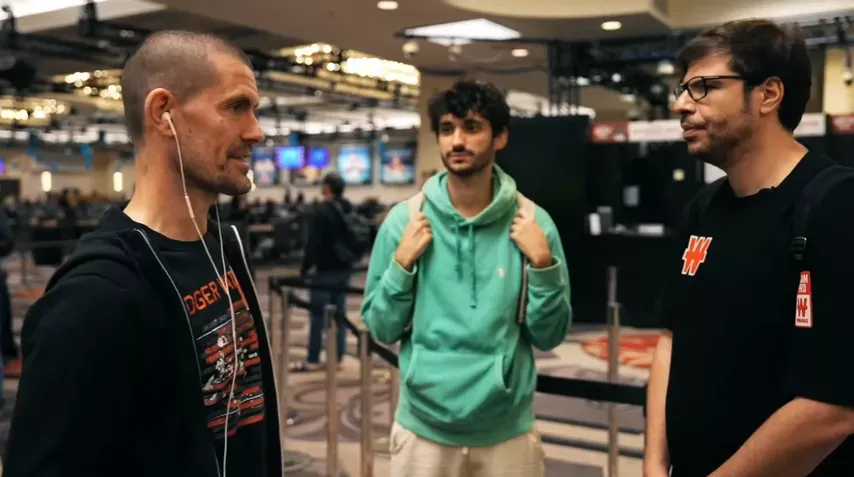
— Mustapha Kanit! Hello!
— How are you doing?
— Nothing. 55k.
— Okay. I have 53k.
— Interesting table. Active, active, active, active, me, and tight, tight, tight. When everyone retreats to me, I think I can open up very wide. How much would you raise?
— Well, 100%, of course, isn't worth it, but around 60%, I think, is normal. T9o, T8o and things like that.
There are many great players on the Winamax team, and Mustapha Kanit is undoubtedly one of the best. It's always interesting to hear his opinion on strategy! I'm not new to No Limit Hold'em, but I haven't played it much in the last 10 years, and poker is constantly evolving. Computers, solvers, many hardworking students... That's why I try not to miss the opportunity to receive good advice.
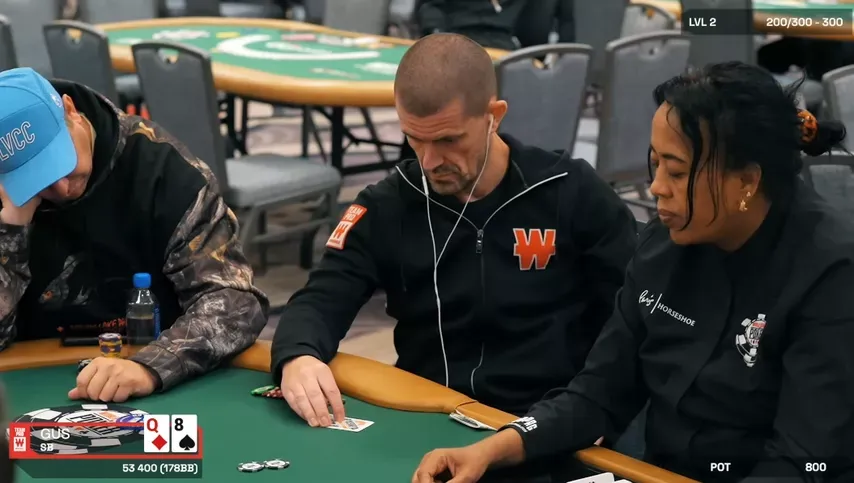
Q8o is a good hand for the small blind. I raise to 700. The BB calls.
Flop (1,700):
We don't connect, but my range has an advantage, so I can c-bet even with these hands. I bet 400 chips. The opponent seems interested and calls. I don't like it very much.
Turn (2,500):
A pair appears! Now I may have the best hand. I'm beating all pairs except and . I'll continue: 1,400. And this turns out to be enough: the opponent folds. All is well, but here's the question: if a nine had come up on the turn, would you have bet the same 1,400? In Mustapha's opinion, I should bet. We discussed this during the break. However, I'm not sure I would have followed his advice.
Meanwhile, the player in position #4 makes a second squeeze. Did he increase his aggression? Or did he just get dealt good hands? It's worth remembering and perhaps facing him next time with a 4-bet.
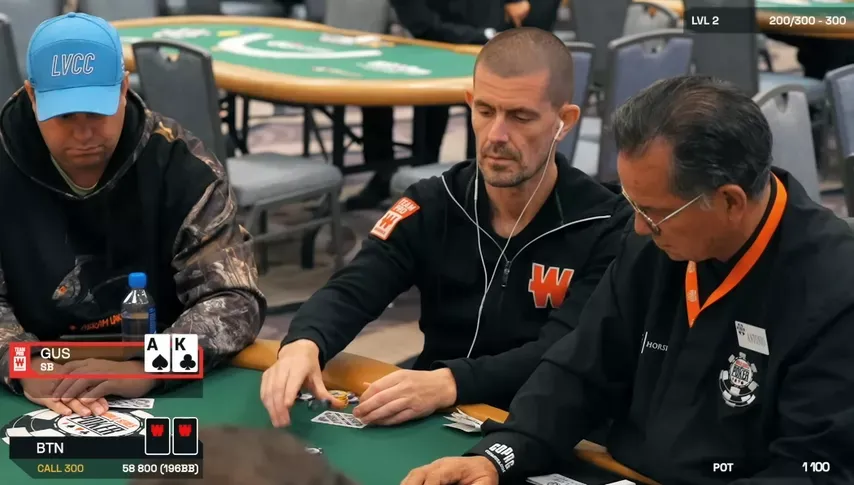
I call the raise from position #7 with KJo. The BB enters the pot with us.
Flop (2,600):
It's not a very good board. I get two checks, and I pass behind them.
Turn (2,600):
Two more checks. It's probably time to bet. I might have the best hand, and I might also eliminate a slightly stronger hand. I bet 800 chips. The BB folds, but position #7 calls. It didn't work.
River (4,200):
I will not continue on this river. I check back and lose against . Let him take it. I could have played differently and won the pot or not lost those 800 chips, but I can't say I'm not happy with my line. In the past, these types of bets worked well and were enough to take down abandoned pots. Today they play with more tenacity; no one here is going to throw away their just because he didn't get a pair on the flop.
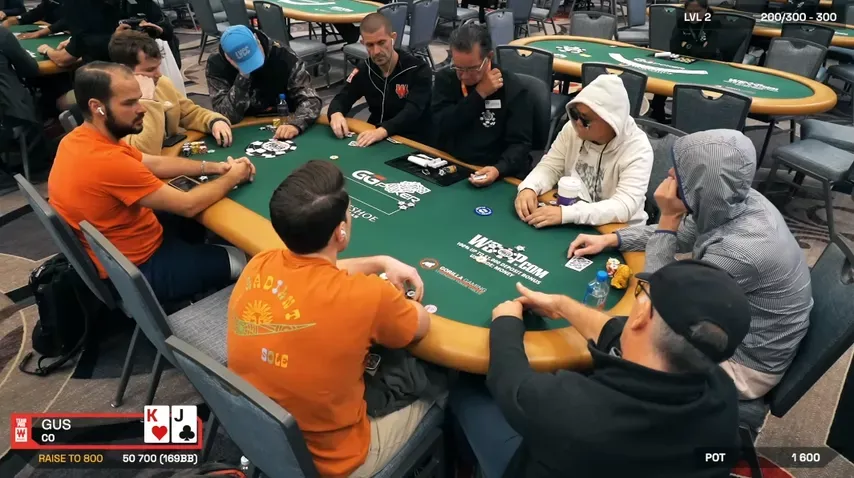
And KJo again. I raise to 800. The button calls. He started playing more actively, but he didn't re-raise, he just called. The big blind also called.
Flop (2,900):
BB check. I'm running out of small chips, so I bet 900. Both players call: I'm going to need something big to continue on the turn!
Turn (5.600):
It's not my card at all, and it also closes a couple of draws. The big draw suddenly leads by 3,100 to two. A little Hollywood and I throw my cards into the muck. The button follows my example. A new player sits at the table: until now, position #5 was empty.
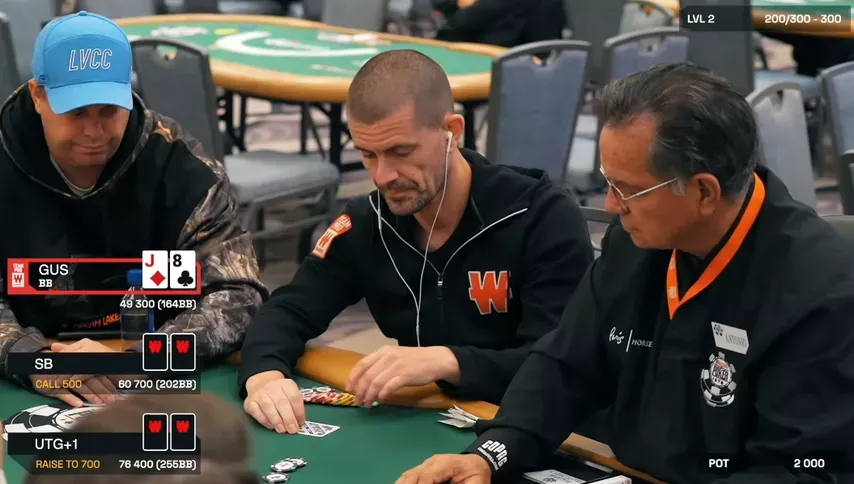
One of the rare raises from #2 position, from early position. The range there is definitely very tight, but I'm not used to folding in the big blind to min-raises. J8o: OK, I call.
Flop (2,400):
We both fold.
Turn (2.400):
The small blind bets 1,600. He often shows aggression when everyone else has checked on the previous street. Folding is out of the question. I decide to raise to get rid of the opponent: 4,400. Both opponents fold quickly. I could have called and given the small blind a chance to bluff the river, but I'm not too bothered.

A mysterious button limp in position #8. I have an AKo, so I decide to follow suit. Check the BB.
Flop (1,200):
After the check, I bet 300. It's unlikely that such a line would be recommended in textbooks. The BB folds, the button raises to 700. I don't want to fold yet.
Turn (2,600):
A nasty card. I check. He bets 1,000. My powerful preflop hand looks pretty mediocre on this board. I can't think of any reasonable reason to continue, so I give up. The odd limp from the button could have won him the hand. But that's okay, no problem.
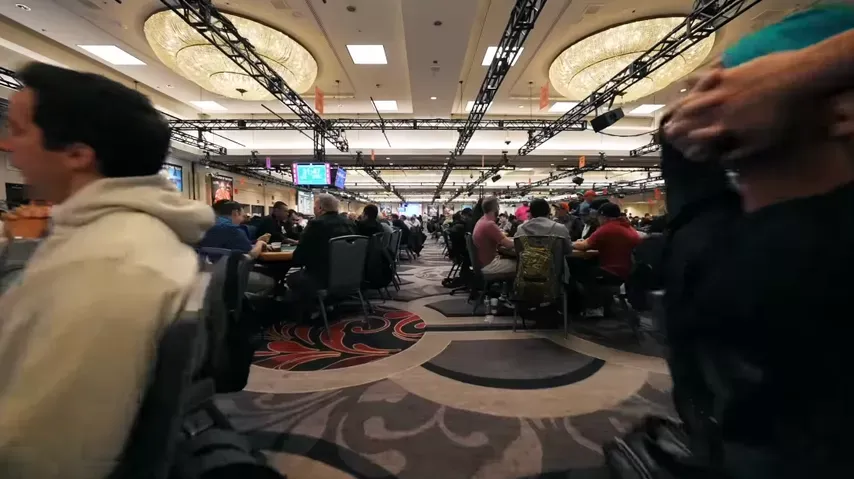
In the first three hours, Gus Hansen's stack fell from 60,000 to 52,000. However, there's no rush, as the Main Event structure is very slow and fluid, a true marathon, and there's still plenty of play left.
